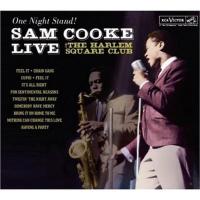Sam Cooke on the Chitlin Circuit!
The contrast between this Sam Cooke playing a tiny Miami stop on the Chitlin circuit and the one who showed up at New York's Copacabana the next year couldn't put the singer's flip sides into greater relief.
Sophisticated, facile and somewhat aloof and almost condescending in New York, Cooke is raw and gritty in front of the Harlem Square Club crowd. He keeps his cool side in check.
Though Cooke mesmerizes the audiences in both locations he connects directly and down home with the Harlem Square Club audience, which is not afraid to sing along heartily, backed by sax man King Curtis and his band along with Cooke's regular guitarist and drummer.
Even when in raw form, Cooke exudes a bit of nightclub slick covering his pop hits including 'Chain Gang,' 'Cupid,' 'Bring It On Home to Me,' and of course 'Twistin' The Night Away.' Cooke's influence on a generation of soul singers who followed can easily be heard on this record as can Rod Stewart's gravelly tonality, his phrasing and his not so innocent wink and nod. Stewart built a career channeling Sam Cooke. King Curtis' influence on a generation of sax players is also on display here. Listen to Curtis's high honking and you'll hear his influence on Saturday Night Live's Lenny Pickett.
Cooke got so much from a few simple, lame, rock and roll chord changes! On this recording you can hear him skillfully weave the tunes together with patter and what today would be considered little more than slick nightclub shtick including clueing the band when to stop.
Cooke gets away with it because he had an unstoppable combination of originality, vocal skills and incredible charm. He doesn't let down or break a link for an instant as he moves through the tunes, bouncing from one to the next with juggling patter that exhorts and encourages both the crowd and the backing musicians.
For some reason, this recording languished for more than 22 years in the RCA vaults until 1985 when it was issued on vinyl as AFL1-5181. Anyone familiar with RCA engineering knows both Bob Simpson and Anthony Salvatore. Simpson recorded everyone from Bob and Ray to Charles Mingus (for Impulse) and Salvatore was one of RCA's trusted classical music engineers so one can only imagine them placing microphones on the meager Harlem Square Club's stage and running the wires to a crowded backstage where they placed their 3 track Ampex recorder.
The original vinyl was probably all analog while this reissue is a remix to DSD (Super Audio CD). Anyone familiar with the RCA 'house sound' of guys like Simpson and Salvatore will not recognize it in Rosenthal's flat and gritty sounding remix. Put on the original and the announcer sounds as if he's right there in front of you. Cooke's voice appears suspended in a space, with plenty of room sound behind him. The cymbals ring with a smooth and extended feelthe kind you hear live. You're drawn into the performance.
I wish I could say this reissue features great sound but it doesn't. The sensation of the room is gone, the audience singing in the background is in the same spatial plane as Cooke, the drums are gritty instead of sweet. In fact, everything is gritty-sounding and flattened into two dimensions compared to the original.
Not that the reissue sounds bad. It offers greater dynamic punch than the original and perhaps more impact, but real? No. The original produces the sensation of three-dimensional reality.
Sony/Legacy's Rainbo Records pressing is decently finished, quiet and free of the audible defects that unfortunately plague most copies of the blue Kind of Blue included in the recently released box set. Sony/Legacy's jackets are too flimsy.
If you can find an original RCA, get it. Even though it's on thin, undistinguished vinyl, it communicates a sense of reality far better than does this reissue. However, this is such a special, worthy document, get it any way you can. Cooke's magic transcends the delivery technology.
- Log in or register to post comments




